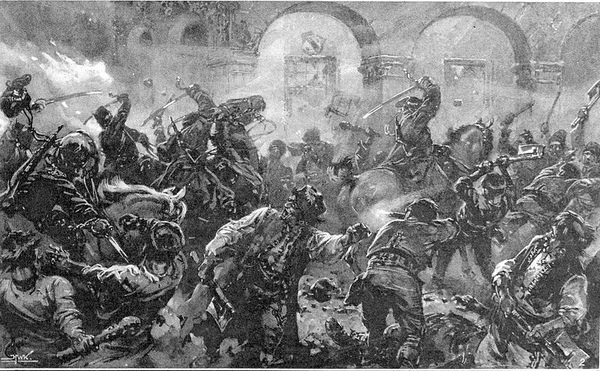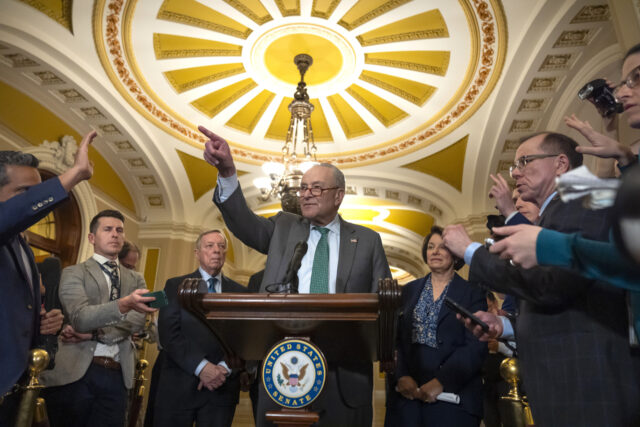By Shoshana Bryen
There is anger and then there is righteous anger. Peter Finch yelling out the window, “I’m mad as hell and I’m not going to take it anymore.”
From Iran, Iraq, and Lebanon, where parts of a whole are coming undone, to Hong Kong to Puerto Rico to France and Venezuela, people are mad as hell.
Consider Lebanon. Independent in 1943, but occupied by Syria from 1975-2005, and brought into Iran’s orbit through the creation of Hezb’allah in the early 1980s, the same constellation of politicians have held power since the end of the civil war in 1990. Americans appear to worry most about the security implications of Hezb’allah, a U.S.-designated terror organization with its own army and a drug/weapons/money racket in South America, pulling strings in Beirut. And worry, too, about the U.S. armed and trained Lebanese Armed Forces (LAF), working alongside and sometimes in cooperation with Hezb’allah. Hassan Nasrallah calls the LAF “a partner.”
But how did Lebanon come to this point and why are people angry now?
Multiethnic and multicultural, Lebanese politics are sliced into sectarian segments; you are Druze or Shiite or Maronite Christian. The government has no national commitments, only confessional ones, which makes it easy to set one group against another, leaving the best-armed and richest on top, i.e., Hezb’allah. That is also a recipe for corruption -- take care of your own and the devil take the rest, also the devil is the rest. Lebanon ranks 147th out of 183 countries in Transparency International’s Corruption Index. There are 6-7 million Lebanese (numbers vary widely because so many live abroad). Government debt is $89.5 billion and interest payments consumed 48 percent of domestic government revenues in 2016. The debt-to-GDP ratio is 151% with an annual growth rate of negative 0.2 percent for 2019. The Lebanese pound has lost more than 60 percent of its value in recent weeks on the black market.
Lebanon has been in a “trash crisis” since 2015 -- municipalities (based on sectarian lines) are supposed to collect trash, but the central government’s payments for collection have been “erratic” according to local sources.
Unregulated dumps, open burning, trash piling up in the streets and pouring into Mediterranean Sea have led to health concerns far beyond Lebanon’s borders. A wave of forest fires in October 2019 made things immeasurably worse. The people in the south have an additional problem -- Hezb’allah has been putting rockets and missiles in their homes and villages for years, planning for the next strike against Israel.

The trash and forest fires were the proximate cause of the protests in Lebanon that began in October, but the real cause appears to be the unwillingness of Lebanese millennials to be ruled by the corrupt, Hezb’allah-led regime. Demands for secular government, more services, and the presence of the Lebanese flag rather than factional banners highlight the protests. The demise of Qassam Soleimani appears to have emboldened the protesters, while the government, feeling the heat, has been increasingly brutal. More than 500 people have been injured in the past week, but the protesters appear determined to force a change in government, chanting “revolution” in the streets.
Iran and Iraq, with some differences, are following the Lebanese model, with young people -- and women out front in Iran -- demanding change. Iraqi millennials have been attacking symbols of both their government and the Iranian government. Protests are primarily wrecking the south -- Shiite Iraqis demanding that Shiite Iran go home. More than 600 people have been killed. In Iran, protests ostensibly about the downing of a Ukrainian airliner have become louder, more violent, and more overtly demanding that the mullahs step down -- the death toll there is more than 1,000 and the UN says it has evidence that the government issued "shoot to kill" orders.
Hong Kong against China and Venezuelans against a stolen election and the impoverishment of their once-comfortable and democratic country. In France, “yellow vests” protest against economic conditions. Puerto Ricans against… Puerto Ricans?
When Hurricane Maria hit the island in 2017 the island was devastated, most particularly the fragile electrical grid. Rescue and relief efforts were hampered by terrain, finances, and politics, and a sniping match ensued between President Trump and Roberto Rosellό, the governor of Puerto Rico. Almost a year later, 80 percent of Puerto Ricans graded the President as Fair/Poor in his response to the devastation -- but 74 percent rated the Puerto Rican government the same. Rosellό was forced by massive protests to resign.
Fast forward to January 2020 and the discovery that emergency aid from the mainland had been stashed in warehouses and not distributed. The people are in the street again, protesting their government’s apparent disdain for them. This time, protesters brought a guillotine -- no word on whether it was operational.
Righteous anger is truly something to behold.

